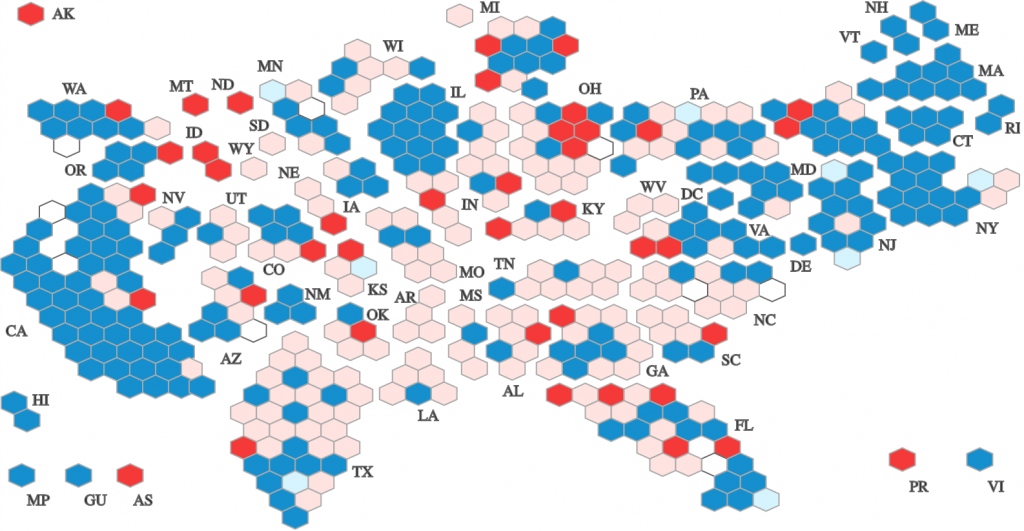Politics
Analysis: Breaking Down Congress’s Vote To Protect Legal Marijuana States From Federal Enforcement

In one of the most significant legislative victories in the history of the marijuana reform movement, an amendment blocking the Department of Justice from interfering in state-legal cannabis programs was approved for the first time in the U.S. House of Representatives last week.
In a 267-165 vote, the measure passed handily, drawing support from all but eight Democrats and nearly a quarter of the Republican caucus. The amendment’s passage seems to affirm what advocates have suspected—that broad reform is within arm’s reach in the 116th Congress.
But a closer look at the vote tally reveals subtle trends, dissents, individual vote flips and developments that paint a fuller picture of the state of marijuana politics in the Democratic-controlled chamber.
First, a top-level look: the last time this amendment was up for consideration in 2015, it came nine flipped votes short of passing, with a final tally of 206-222. It gained 61 “yes” votes in that time, which is a reflection of evolving public opinion on the issue and was also likely influenced by the fact that several sizable states such as California, Michigan and Illinois have since opted to legalize cannabis, putting pressure on lawmakers to embrace a policy that protects their constituents from federal harassment.
State Action Makes A Difference
Geographic changes in the vote tally can be seen in the images below, courtesy of GovTrack.us. Blue represents Democrats and red represents Republicans, with dark shading indicating “yes” votes and lighter shading standing for “no” votes.
2015:

2015 vote, via GovTrack.us
2019:

2019 vote, via GovTrack.us
Among states that legalized adult-use marijuana subsequent to the prior amendment’s consideration, here’s how the the number of “yes” votes for the measure grew:
- California: 40 vs. 46
- Illinois: 10 vs. 14
- Massachusetts: 6 vs. 9
- Maine: 1 vs. 2
- Michigan: 6 vs. 10
- Nevada: 2 vs. 3
- Vermont: 1 vs. 1
But not all of the growth came from states that have recently enacted legalization. All told, 20 individual members who were present for the prior amendment’s consideration switched their vote from “nay” to “aye” since 2015.
“No” to “yes” votes:
- Rep. Karen Bass (D-CA)
- Rep. Joyce Beatty (D-OH)
- Rep. Yvette Clarke (D-NY)
- Rep. Emanuel Cleaver II (D-MO)
- Rep. Jim Cooper (D-TN)
- Rep. Debbie Dingell (D-MI)
- Rep. Bob Gibbs (R-OH)
- Rep. Morgan Griffith (R-VA)
- Rep. William Keating (D-MA)
- Rep. Joseph Kennedy (D-MA)
- Rep. Dan Lipinski (D-IL)
- Rep. Stephen Lynch (D-MD)
- Rep. Tom Reed II (R-NY)
- Rep. Lucille Roybal-Allard (D-CA)
- Rep. Terri Sewell (D-AL)
- Rep. Mike Simpson (R-ID)
- Rep. Paul Tonko (D-NY)
- Rep. Marc Veasey (D-TX)
- Rep. Filemon Vela (D-TX)
- Rep. Greg Walden (R-OR)
Meanwhile, seven members flipped their votes in the opposite direction.
“Yes” to “no” votes:
- Rep. Rob Bishop (R-UT)
- Rep. Mo Brooks (R-AL)
- Rep. Vern Buchanan (R-FL)
- Rep. Jeff Duncan (R-SC)
- Rep. Barry Loudermilk (R-GA)
- Rep. Scott Perry (R-PA)
- Rep. Scott Tipton (R-CO)
Support And Opposition Across Party Lines
The measure enjoyed some bipartisan support, but while a sizable bloc of members joined the “aye” side, there were actually four fewer total Republicans who voted in favor of the amendment this round as compared to 2015. Why? The shift is partially related to loss of marijuana-friendly GOP members in the 2018 midterm election. For example, Reps. Dana Rohrabacher (R-CA), Carlos Curbelo (R-FL) and Mike Coffman (R-CO) each voted in favor of the 2015 amendment and otherwise championed cannabis reform to some extent, but lost reelection bids last year.
Plus there are those noted above who actually supported the measure last time but voted against it this year.
Perhaps some members took issue with the broader language of the new version, which extended protections to Washington, D.C. and U.S. territories, unlike the prior amendment, which lined up more squarely with Republican “states’ rights” views.
Another explanation could come down to partisanship. GOP Congressman Tom McClintock of California was the lead sponsor of the 2015 version, when Republicans controlled the House, whereas Rep. Earl Blumenauer (D-OR) took the helm this year, with McClintock as a cosponsor. With dozens of amendments to consider in a row in floor voting blocks of just two minutes each, it’s within reason to assume that some lawmakers approached some votes along party lines, leading some Republicans to vote for the prior measure led by their caucus-mate in 2015 after a quick glance.
An even simpler answer to the question of why there were fewer Republican “aye” vote this time is that there are just fewer GOP members in the chamber to begin with in light of Democrats’ electoral success in last year’s midterms in which they readily won control of the chamber.
Regardless, the 267-vote win is remarkable. More members voted for this amendment than they did for a narrower measure that simply prevented Justice Department interference in state medical cannabis programs in 2015. That tally was 242-186.
After the amendment was adopted, questions remained about the eight Democratic members who voted against the measure, given that marijuana reform is widely popular, especially among the party’s voters.
The most noteworthy Democratic “nay” vote came from Rep. Debbie Wasserman Schultz, the former chair of the Democratic National Committee, who has historically been opposed to many cannabis reform measures. She was joined by Reps. Henry Cuellar (D-TX), Sharice Davids (D-KS), Josh Gottheimer (D-NJ), Conor Lamb (D-PA), Collin Peterson (D-MN), Tom Suozzi (D-NY) and Jeff Van Drew (D-NJ) in opposing the measure.
But overall, Democratic members sent a forceful message about where the party stands on the issue. Leadership sent a “yes” recommendation in a whip email distributed before the vote, and presidential candidates and even some who’ve historically been reluctant to back cannabis reform joined hands to push the measure forward.
Presidential hopefuls Reps. Tulsi Gabbard (D-HI) and Seth Moulton (D-MA) voted for it. (Other contenders Reps. Eric Swalwell (D-CA) and Tim Ryan (D-OH) were absent for the vote as well as others taking place on Thursday.)
Leadership votes in favor of the amendment include Judiciary Committee Chair Rep. Jerry Nadler (D-NY); Appropriations Committee Chair Rep. Nita Lowey (D-NY); Commerce, Justice and Science Appropriations Subcommittee Chair Rep. Jose Serrano (D-NY); Majority Leader Steny Hoyer (D-MD); Deputy Speaker Ben Ray Luján (D-NJ) and Majority Whip Jim Cylburn (D-SC).
Every Democratic member of the Judiciary Committee voted in favor of the measure—another positive sign as lawmakers continue to pursue various pieces of marijuana legislation that will likely have to pass through the panel.
Curiously, however, Rep. Doug Collins (R-GA), minority ranking member on the Judiciary who’s advocated for a separate bill to let states set their own cannabis policies, voted against the amendment. That said, McClintock and other GOP members of the panel—Reps. Kelly Armstrong (R-ND), Ken Buck (R-CO), Matt Gaetz (R-FL), Guy Reschenthaler (R-PA) and Gregory Steube (R-FL)—voted for the measure, indicating that broad legislation to reform federal cannabis laws could sail through the Judiciary Committee with solid bipartisan support.
On the Democratic side, Reps. Joe Kennedy (D-MA) and Rep. Dan Lipinski (D-IL), who have historically been hostile to cannabis reform, also voted for the measure this time around.
On the flip side, here are all 41 Republicans who bucked party leadership in voting in favor of the amendment:
- Rep. Justin Amash (R-MI)
- Rep. Kelly Armstrong (R-ND)
- Rep. Don Bacon (R-NE)
- Rep. Troy Balderson (R-OH)
- Rep. Ken Buck (R-CO)
- Rep. Chris Collins (R-NY)
- Rep. James Comer (R-KY)
- Rep. Rodney Davis (R-IL)
- Rep. Russ Fulcher (R-ID)
- Rep. Matt Gaetz (R-FL)
- Rep. Greg Gianforte (R-MT)
- Rep. Bob Gibbs (R-OH)
- Rep. Anthony Gonzalez (R-OH)
- Rep. Jenniffer González-Colón (R-PR)
- Rep. Tom Graves (R-GA)
- Rep. Morgan Griffith (R-VA)
- Rep. Kevin Hern (R-OK)
- Rep. Trey Hollingsworth (R-IN)
- Rep. Duncan Hunter (R-CA)
- Rep. Dave Joyce (R-OH)
- Rep. Thomas Massie (R-KY)
- Rep. Brian Mast (R-FL)
- Rep. Tom McClintock (R-CA)
- Rep. Paul Mitchell (R-MI)
- Rep. Dan Newhouse (WA)
- Rep. Amata Radewagen (R)
- Rep. Tom Reed (R-NY)
- Rep. Guy Reschenthaler (R-PA)
- Rep. Tom Rice (R-SC)
- Rep. Denver Riggleman (R-VA)
- Rep. Mike Rogers (R-AL)
- Rep. Chip Roy (R-TX)
- Rep. David Schweikert (R-AZ)
- Rep. Mike Simpson (R-ID)
- Rep. Greg Steube (R-FL)
- Rep. Fred Upton (R-MI)
- Rep. Greg Walden (R-OR)
- Rep. Michael Waltz (R-FL)
- Rep. Steve Watkins (R-KS)
- Rep. Ted Yoho (R-FL)
- Rep. Don Young (R-AK)
Who Voted To Let The Feds Arrest Their Constituents?
While the increased number of votes in favor of the amendment seems to correspond, in part, with the rising number of states with legal marijuana programs, there were 17 members representing legal states who voted against protecting consumers who participate in their state’s cannabis system. Here’s a breakdown:
California
- Rep. Ken Calvert (R)
- Rep. Paul Cook (R)
- Rep. Doug LaMalfa (R)
- Rep. Devin Nunes (R)
- Minority Leader Kevin McCarthy (R)
Colorado
- Rep. Doug Lamborn (R)
- Rep. Scott Tipton (R)
Illinois
- Rep. Mike Bost (R)
- Rep. Adam Kinzinger (R)
- Rep. Darin LaHood (R)
- Rep. John Shimkus (R)
Michigan
- Rep. Jack Bergman (R)
- Rep. Bill Huizenga (R)
- Rep. John Moolenarr (R)
- Rep. Tim Walberg (R)
Nevada
- Rep. Mark Amodei (R)
Washington
- Rep. Cathy McMorris Rodgers (R)
Advocates walked away with a demonstrable win on Thursday but, as a final note, the roll call tally might well have been even larger if it weren’t for certain absentees. Besides Ryan and Swalwell, those members include Reps. Alcee Hastings (D-FL), Ann Kirkpatrick (D-AZ) and Tom Emmer (R-MN)—all of whom voted in favor of the measure in 2015. There was just one member absent from the latest vote who voted against it last time.
Another indicator bodes well for the future of marijuana reform by demonstrating growing support from political newcomers is that among current members of Congress who weren’t in office during the 2015 vote, 98 voted in favor of the amendment while 50 voted against it.
Though advocates are celebrating the historic victory in the House, it remains to be seen whether the Republican-controlled Senate has an appetite for reform. That chamber’s Appropriations Committee is expected to begin its consideration of appropriations legislation that a similar amendment could potentially be attached to within the next few weeks.
Congressman Withdraws Veterans Marijuana Measure Amid VA Opposition
Photo courtesy of Philip Steffan.















